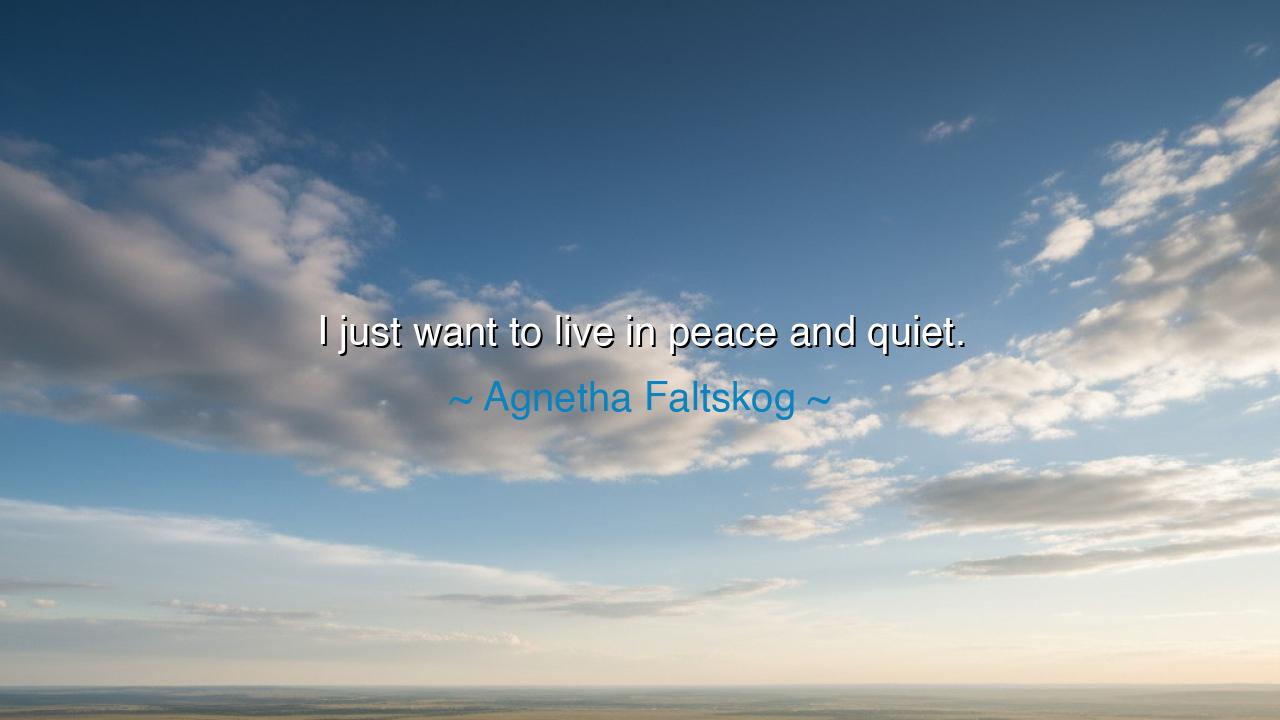
I just want to live in peace and quiet.






“I just want to live in peace and quiet.” Thus spoke Agnetha Fältskog, the voice of ABBA, whose life was once lived before the eyes of millions, yet whose heart longed for something simple, something eternal. In her words lies the cry of all who have tasted both the thunder of fame and the silence of solitude, and who have discovered that true wealth is not measured in applause, but in the serenity of peace and the stillness of quiet. For what is glory without rest? And what is power without calm?
The meaning of this saying is profound in its simplicity. Every soul seeks fulfillment, but not all find it in noise and ambition. Some discover, after the storm of striving, that the truest treasure is a life lived gently—without endless conflict, without unceasing demands, without the harshness of constant exposure. Peace and quiet are not signs of weakness, but of wisdom; not the retreat of cowards, but the refuge of those who know the soul must breathe in stillness if it is to endure.
The ancients spoke this truth. The Stoic philosopher Seneca wrote that “the greatest blessings of mankind are within us and within our reach.” He warned that endless ambition, endless noise, and endless striving lead only to restlessness. The wise man, he said, is content with simplicity, content with inner peace. Likewise, the Chinese sage Laozi praised the quiet life, teaching that the greatest power comes not from controlling others, but from mastering oneself in harmony with the Tao. Agnetha’s words echo these eternal voices: simplicity and serenity are the true crowns of life.
History gives us examples of those who, weary of conflict, longed for the stillness of a quieter path. George Washington, after leading a revolution and serving as the first president of the United States, turned away from the throne that many would have offered him. Instead, he returned to his farm at Mount Vernon, desiring only a life of quiet cultivation. He had tasted the burden of power and sought the gift of stillness. Like Agnetha, he declared through his actions that greatness is not only in ruling, but also in knowing when to step back into peace and quiet.
Yet we must not mistake this desire as weakness. To long for peace is not to shrink from life’s struggles, but to understand that the heart cannot live forever in turmoil. A soldier longs for home not because he is afraid, but because he knows that rest is sacred. An artist longs for silence not because she has nothing left to say, but because she knows that silence itself speaks. The longing for peace is the longing for balance, for harmony, for the restoration of the soul.
The lesson for us is clear: do not despise stillness. In a world that glorifies noise, busyness, and endless ambition, dare to honor your need for quiet. Set aside time for solitude, for reflection, for rest. Seek peace not only in the world around you, but in the world within you. Do not wait for exhaustion or despair to teach you the value of calm—choose it now, as a daily practice.
Therefore, children of tomorrow, remember Agnetha’s wisdom: do not be deceived by the glitter of fame or the endless chase of ambition. True fulfillment may be found not in the roar of the crowd, but in the whisper of the wind, the stillness of morning, the quiet of a peaceful heart. Seek that peace with courage. Build that quiet into your days. For in peace and quiet, the soul remembers itself, and in remembering, finds the joy that no storm can take away.






CCMy Cu Cki
I feel like Agnetha Faltskog’s desire for peace and quiet is something many of us can relate to, especially in such a noisy, fast-paced world. But what happens when the quest for peace turns into isolation or withdrawal from society? Is it still healthy to seek total peace, or do we need to find a balance between quiet time and meaningful engagement with the world around us?
NDPham ngoc duy
This quote makes me think about the importance of mental peace. Agnetha Faltskog seems to long for a break from the noise, and I wonder if the constant exposure to stress in daily life makes it hard for many people to achieve this kind of tranquility. Do you think it’s possible to cultivate inner peace even if our external environment is anything but quiet? How do we build inner calm?
VDTu Vuong Duy
Agnetha Faltskog's wish for peace and quiet resonates deeply with me. In a world where noise and distractions are constant, how do we balance our need for peace with the responsibilities and obligations we face every day? Can true peace only be found in isolation, or is it possible to create a peaceful environment even in a busy life full of commitments and people?
ATVuong Anh Tho
I completely understand Agnetha Faltskog’s desire for peace and quiet. In today’s world, everything is so fast-paced and chaotic that finding a moment of calm can feel impossible. But is it realistic to think we can achieve that peace in our busy lives, or does it require major changes in how we live or even where we live? What steps can we take to create moments of quiet in our hectic schedules?